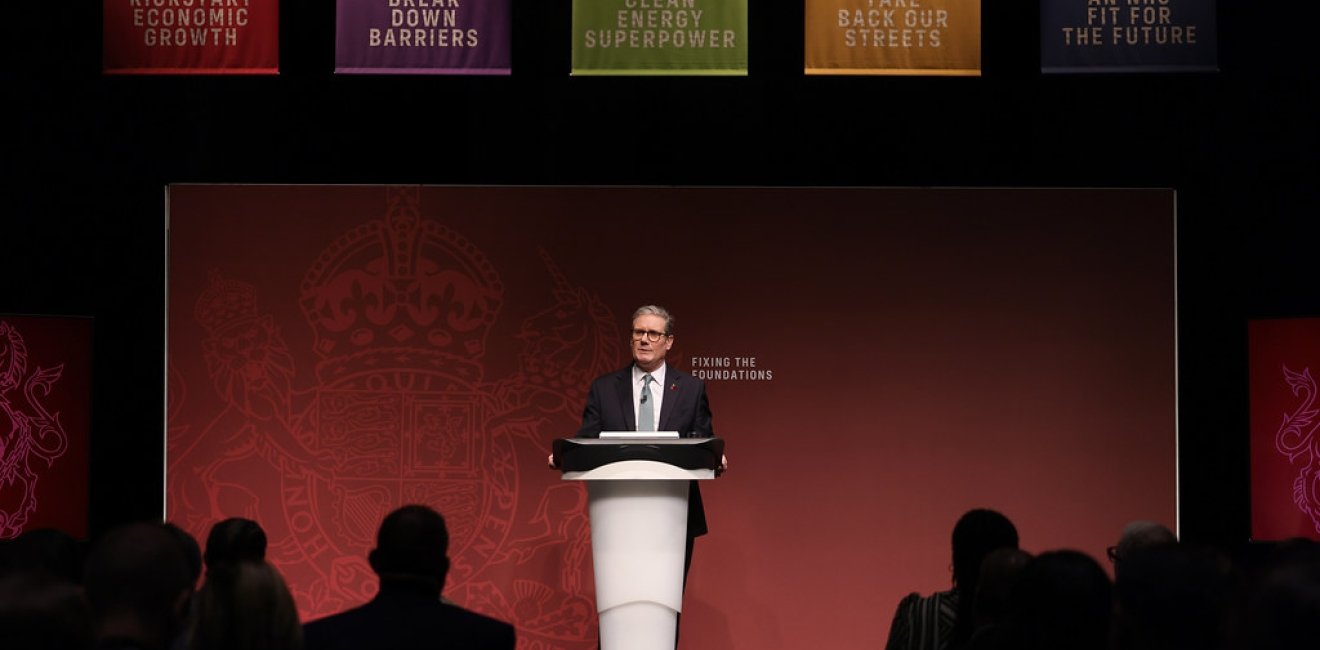While the term "first 100 days” is regularly applied to the presidential effort to act quickly and pass legislation in the United States, it has recently been used to evaluate Keir Starmer’s progress as British Labour Party leader. After an electoral landslide in July that led to a historic Labour majority in Parliament after fourteen years out of power, Starmer highlighted the need to address what he called the “rubble and ruin” of Conservative policies. His first 100 days have seen a decline in public approval as tensions over gifts from wealthy donors, a rebellion over cuts in winter fuel subsidy payments, and infighting among party officials have detracted from actual efforts to govern. Starmer had outlined in his election manifesto five ‘missions’ for an incoming Labour government. For him, this meant stabilizing the economy and promoting economic growth, supporting public services, clean energy, and criminal justice and judicial reform as key priorities. But governing often comes with unexpected challenges as a spate of violence from anti-immigration mob riots, prison overcrowding necessitating early releases, and the terrible state of public services have only added to the government’s woes. He inherited a weak economy, criticizing the Conservative government for a £22 billion "black hole" in the public finances.
Starmer’s first budget under the direction of Chancellor Rachel Reeves has been heavily scrutinized as Labour seeks to foster growth, generate investment, promote affordable housing, and target tax increases that impact those at the top of the income bracket. Public spending priorities will be the result of changes to the fiscal rules to allow the government to borrow money to invest in public services – a key priority among the electorate. While the taxes announced in its manifesto – on non-domiciles and private school fees – to pay for more services were anticipated, the budget includes tax increases on capital gains, inheritance taxes, and employer national insurance contributions. The inheritance taxes that will now be levied on farms, including agricultural property relief, have generated a major political backlash among farming groups. Labour argues that those affected are wealthy landowners who have paid no inheritance taxes for decades and have been the major beneficiaries of agricultural property relief. But there are growing concerns that farm profits are often marginal, so that the existing tax exemptions ensure the survival of family farm businesses. These increases in tax revenue have, however, been offset by efforts to raise the minimum wage, increase local spending, and spur investment in schools and housing. Starmer is courting the working class, Labour’s traditional base, through such policies.
Yet the optics around Starmer’s first few months in office have detracted from the actual policies. The first 100 days have been ambitious. Currently, the government’s legislative agenda comprises around forty pieces of legislation. These include an ambitious Employment Rights Bill that will address zero hours contracts and abusive fire and rehire practices, a Renters’ Rights Bill designed to address evictions without reasons, a National Wealth Fund aimed at leveraging public and private investment for the green economy, a Border Security, Asylum and Immigration Bill to tackle irregular immigration and criminal smuggling, speed up removals for failed asylum claims as well as increasing security of borders, and a Crime and Policing Bill to enhance community policing, increase vetting standards and ban the sale of violent weapons. Even those Labour Members of Parliament on the backbench have quickly introduced their own private bills on issues including end of life, digital safety, absentee voting, and eligibility for free school meals. While US presidents have been evaluated for their performance in the first 100 days, Starmer might learn from some of those missteps (and successes) to more effectively communicate his goals. The first 100 days are not definitive for assessing his term in office, but Starmer has many advantages with his sizeable majority to deliver on his ‘missions’ to make the public notice that economic and social changes are in fact possible.
Author

Professor and Jean Monnet Chair ad personam, School of International Service, American University

Global Europe Program
The Global Europe Program is focused on Europe’s capabilities, and how it engages on critical global issues. We investigate European approaches to critical global issues. We examine Europe’s relations with Russia and Eurasia, China and the Indo-Pacific, the Middle East and Africa. Our initiatives include “Ukraine in Europe”—an examination of what it will take to make Ukraine’s European future a reality. But we also examine the role of NATO, the European Union and the OSCE, Europe’s energy security, transatlantic trade disputes, and challenges to democracy. The Global Europe Program’s staff, scholars-in-residence, and Global Fellows participate in seminars, policy study groups, and international conferences to provide analytical recommendations to policy makers and the media. Read more

Explore More
Browse Insights & Analysis
Water Security at the US-Mexico Border | Part 1: Background

China and the Chocolate Factory

Ongoing Debate: The Prohibition of GMO Corn in Mexico



